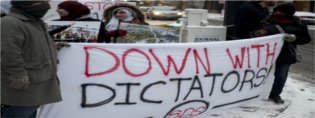Egypt (MNN) — As a result of protests pressuring Egypt's President Mubarak to step down, fear has swept across the Western world that a downed government could mean an entry point for Sharia law. Mubarak's announcement last night that he would remain in office but not run for reelection confirms that someone will need to fill his place.
Protests have been going on for nearly a week now, culminating yesterday with the "March of Millions," which attracted thousands of people demanding the current president step down. Christians and Muslims alike have included themselves in the protests — all parties fed up with the lack of available jobs and the downward slope the Egyptian economy has been riding.
The unrest leaves room for a revamped government system. Several politicos have voiced the concern that the Muslim Brotherhood could be the group to take the place of Mubarak's regime.
The International Mission Board does not, however, share these concerns. IMB staff member ‘Michael' lived in Egypt for years. He says although the introduction of Sharia law is possible, it seems unlikely to be implemented, even in a majority-Muslim country. Michael says Christians are not the only ones who would view a strict Islamic government as a threat.
"The rank and file of Egyptians that we've talked to–Muslims–have also recognized that that would not be a good scenario for their country. They know that it would curtail a great many of the freedoms that they enjoy," confirms Michael.
Although Michael admits that some believers are scared of a potential move toward harsher religious restrictions depending on who picks up the country's reins, Christians mostly appear optimistic. In fact, many believers are eager to use this time as an opportunity to share their faith.
"What I see across the region is that we may have an initial period of instability that really translates into a time of great opportunity to get [the Gospel] message out there," noted a Christian worker in North Africa in a recent IMB report. The report went on to say that believers are "guardedly optimistic" that the unrest may have opened people further to the Gospel.
Longer term, Michael says, IMB is hopeful that the protests will not only encourage immediate outreach, but will pave the way for greater religious freedom in the future.
"The best case scenario would be that whatever government comes in would allow more freedoms than we've seen in the past; that both national believers and those who come from the outside working in the country would be allowed greater freedoms to be able to share the Gospel; that we'd be able to see church planting and church buildings, the opportunities for that to open up," says Michael.
Of course, no one can be sure what will happen. Everything on both sides of the spectrum at this juncture is speculative. The best thing for all believers to do now is pray.

